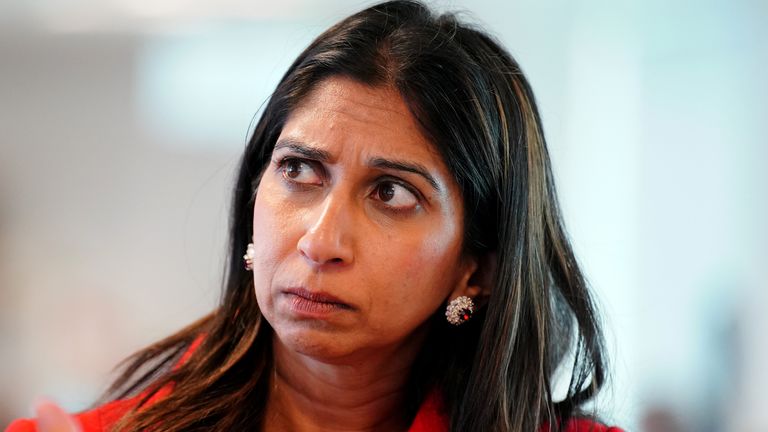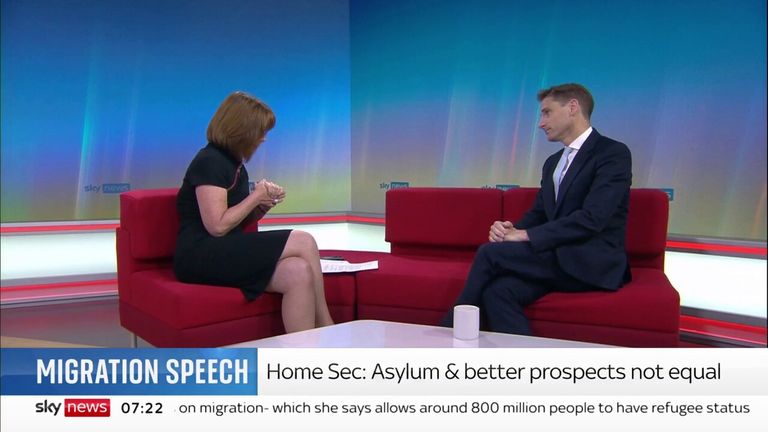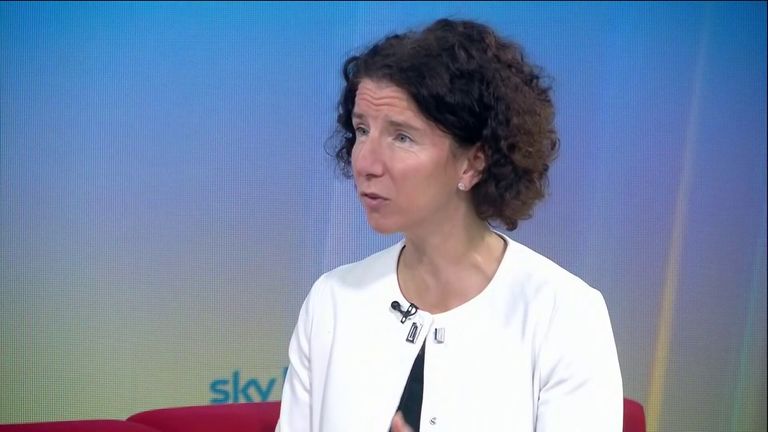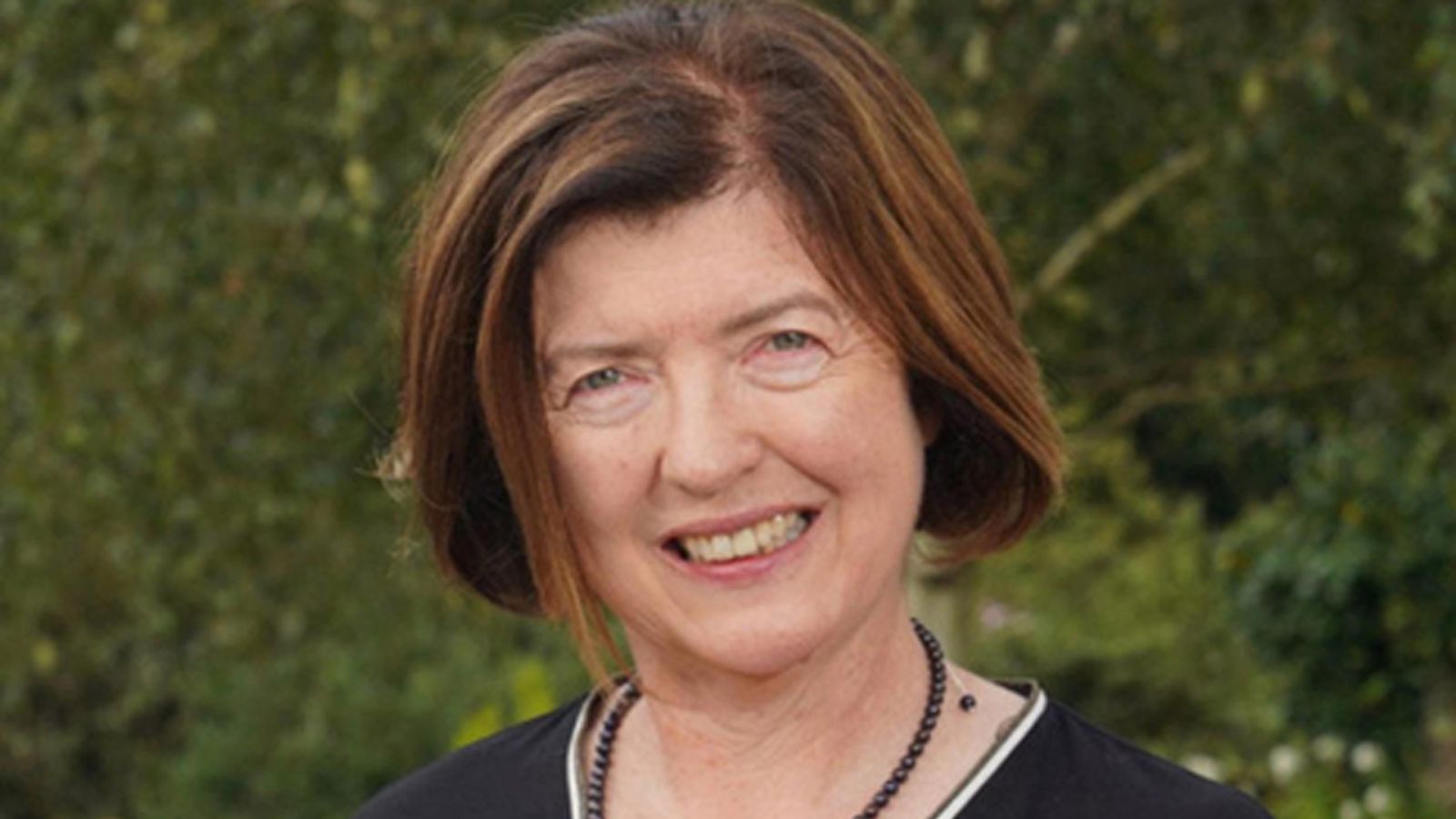
The home secretary has suggested the United Nations 1951 Refugee Convention needs updating to stop “simply being gay or a woman” being a reason for people to claim asylum in the UK.
In a speech to a right-wing thinktank in New York today, Suella Braverman will ask whether the 1951 convention is “fit for our modern age” or “whether it is in need of reform”.
She cites the rising number of refugees across the world and those arriving in the UK in small boats as proof we “now live in a completely different time” to when the convention was written.
Here Sky News looks at what the convention says and how difficult it would be to change.
What does it say?
The UN Convention Relating to the Status of Refugees was originally signed by 28 countries, including the UK, in Geneva in July 1951.
As a “post-Second World War instrument” it was “originally limited in scope to persons fleeing events occurring before 1 January 1951 and within Europe”, namely the Holocaust.
But it has since expanded and updated with more than 100 countries now signatories.
It defines what a refugee is, what rights they have and what obligations states have to them when they arrive.
According to the convention, a refugee is “someone who is unable or unwilling to return to their country of origin owing to a well-founded fear of being persecuted for reasons of race, religion, nationality, membership of a particular social group, or political opinion”.
With the development of international human rights law, the convention says it should now be applied “without discrimination as to sex, age, disability, sexuality, or other prohibited grounds of discrimination”.
Analysis:
The city of immigrants is being ‘destroyed’ by migration
Braverman’s rhetoric risks backfiring
It gives refugees the right to “non-discrimination, non-penalisation and non-refoulement”.
The “non-penalisation” section means refugees “should not be penalised for their illegal entry or stay” in the country they flee to and recognises that “seeking asylum can require refugees to breach immigration rules”.
The “non-refoulement” part bans countries from “expelling or returning a refugee against his or her will, in any manner whatsoever, to a territory where he or she fears threats to life or freedom”.
According to the convention, countries are also obliged to give asylum seekers access to “courts, primary education, work, and documentation, including a refugee travel document in passport form”.
The convention does not apply to refugees who benefit from another specific UN or equivalent humanitarian programme, for example people from Palestine who fall under the UN Relief and Works Agency for Palestine Refugees in the Near East.
What does Suella Braverman want?
The home secretary says that while after the Second World War, the convention conferred protection on around two million refugees, some data analysis suggests that in the current context, this number is now 780 million.
The UN High Commissioner for Refugees (UNHCR) puts the original figure at one million and the current one at 35.3 million, as of the end of 2022.
Suella Braverman argues that the provisions on having a “well-founded fear of persecution” have been watered down to just “discrimination”.
She says this has created an asylum system where “simply being gay, or a woman, and fearful of discrimination in your country of origin is sufficient to qualify for protection”.
Can you change the convention?
The original 1951 convention was updated in 1967 to remove the “geographical and temporal limitations” and give it “universal coverage”.
Since then it has been “supplemented” according to the “progressive development of international human rights law”.
Although the convention itself hasn’t changed – the way courts have interpreted it to rule on cases has – providing new case law for their own and other countries.
Natasha Tsangarides, associate director of advocacy for the charity Freedom from Torture, says Ms Braverman is wrong to say case law now defines a refugee as facing discrimination – not persecution.
“That’s incorrect, there’s no case law to support that,” she told Sky News.
“People, whether they are LGBT or not, need a ‘well-founded fear of persecution’ to be able to seek asylum.”
On the growing numbers of migrants globally, which some estimate could reach a quarter of a billion due to the climate crisis and other conflicts, Ms Tsangarides stresses that isn’t the issue.
“It’s correct to say that more people are on the move than they were before. But of those displaced people, two thirds stay in their country and just move to a different part.
“Of that third who leave, seven out of ten stay in their region, which means only a small fraction of them come to Europe and try to seek asylum in the UK.
“The asylum system is in chaos, not because more people are coming, but because the Home Office has been presided over by chaotic governments that have neglected the system.”
Immigration lawyer Harjap Bhangal also says changing the convention or the way it’s interpreted by judges and Home Office decision makers won’t solve the UK asylum crisis.
Out of 78,768 asylum applications for the year ending June 2023, 71% were approved.
Only six return agreements have been struck in recent years and there is still a Home Office backlog of more than 130,000 cases.
“The problem here is the government isn’t sending as many people back as they used to,” Mr Bhangal said.
“The removals numbers have been whittled down. That isn’t the fault of the convention – it’s the machinery and a case of a bad workman blaming his tools.”
Official changes, like the one in 1967, have to be approved by all 149 member states, Mr Bhangal added, which with Ms Braverman’s lack of success on returns agreements, would be near impossible.
“I don’t think she’s going to get the support,” he said. “At the moment she can’t even get EU countries to sign return agreements, so it’s not even workable.
“Changing the wording of the convention isn’t going to stop the boats – people smugglers don’t care about what the official definition of a refugee is.”






